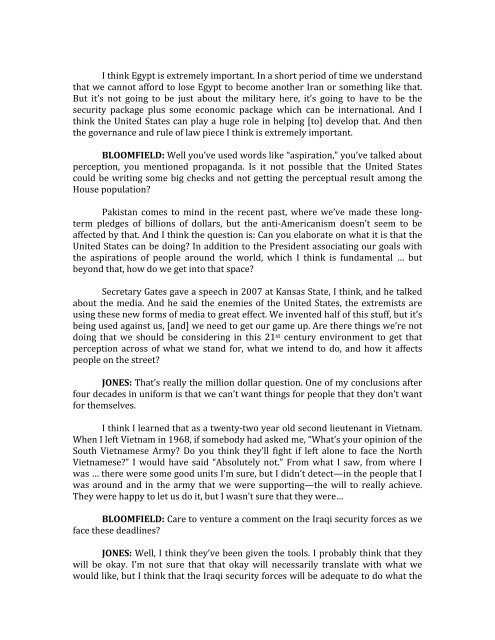Interview of GENERAL JAMES L. JONES, USMC - The Stimson Center
Interview of GENERAL JAMES L. JONES, USMC - The Stimson Center
Interview of GENERAL JAMES L. JONES, USMC - The Stimson Center
You also want an ePaper? Increase the reach of your titles
YUMPU automatically turns print PDFs into web optimized ePapers that Google loves.
I think Egypt is extremely important. In a short period <strong>of</strong> time we understand<br />
that we cannot afford to lose Egypt to become another Iran or something like that.<br />
But it’s not going to be just about the military here, it’s going to have to be the<br />
security package plus some economic package which can be international. And I<br />
think the United States can play a huge role in helping [to] develop that. And then<br />
the governance and rule <strong>of</strong> law piece I think is extremely important.<br />
BLOOMFIELD: Well you’ve used words like “aspiration,” you’ve talked about<br />
perception, you mentioned propaganda. Is it not possible that the United States<br />
could be writing some big checks and not getting the perceptual result among the<br />
House population?<br />
Pakistan comes to mind in the recent past, where we’ve made these longterm<br />
pledges <strong>of</strong> billions <strong>of</strong> dollars, but the anti‐Americanism doesn’t seem to be<br />
affected by that. And I think the question is: Can you elaborate on what it is that the<br />
United States can be doing? In addition to the President associating our goals with<br />
the aspirations <strong>of</strong> people around the world, which I think is fundamental … but<br />
beyond that, how do we get into that space?<br />
Secretary Gates gave a speech in 2007 at Kansas State, I think, and he talked<br />
about the media. And he said the enemies <strong>of</strong> the United States, the extremists are<br />
using these new forms <strong>of</strong> media to great effect. We invented half <strong>of</strong> this stuff, but it’s<br />
being used against us, [and] we need to get our game up. Are there things we’re not<br />
doing that we should be considering in this 21 st century environment to get that<br />
perception across <strong>of</strong> what we stand for, what we intend to do, and how it affects<br />
people on the street?<br />
<strong>JONES</strong>: That’s really the million dollar question. One <strong>of</strong> my conclusions after<br />
four decades in uniform is that we can’t want things for people that they don’t want<br />
for themselves.<br />
I think I learned that as a twenty‐two year old second lieutenant in Vietnam.<br />
When I left Vietnam in 1968, if somebody had asked me, “What’s your opinion <strong>of</strong> the<br />
South Vietnamese Army? Do you think they’ll fight if left alone to face the North<br />
Vietnamese?” I would have said “Absolutely not.” From what I saw, from where I<br />
was … there were some good units I’m sure, but I didn’t detect—in the people that I<br />
was around and in the army that we were supporting—the will to really achieve.<br />
<strong>The</strong>y were happy to let us do it, but I wasn’t sure that they were…<br />
BLOOMFIELD: Care to venture a comment on the Iraqi security forces as we<br />
face these deadlines?<br />
<strong>JONES</strong>: Well, I think they’ve been given the tools. I probably think that they<br />
will be okay. I’m not sure that that okay will necessarily translate with what we<br />
would like, but I think that the Iraqi security forces will be adequate to do what the
















